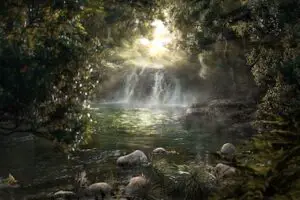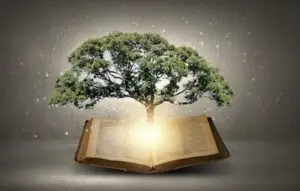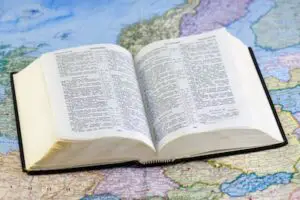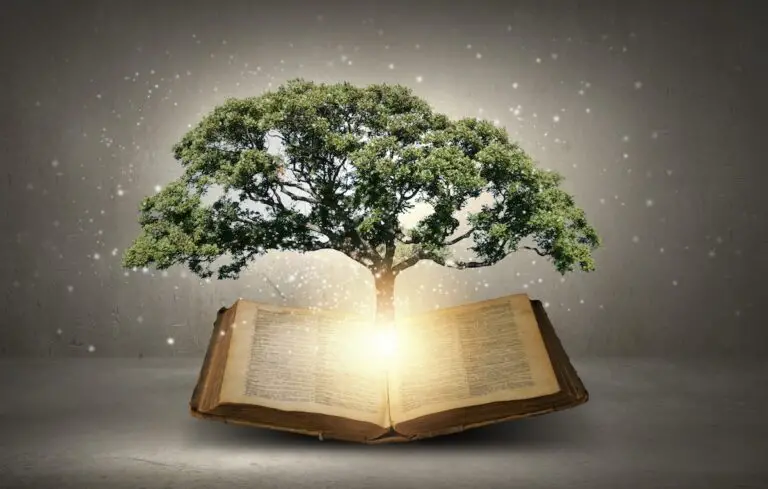Where Is The Garden of Eden?
The Garden of Eden is a legendary location. It has been described in the Bible as the birthplace of the first two people, Adam and Eve. According to the story, God created Adam and Eve in this paradise-like garden. He then gave them instructions to not eat from a forbidden tree. However, they were tempted by Satan. He was disguised as a talking serpent. Eventually, Adam and Eve disobeyed God’s commandment. As a result of this story, the Garden of Eden has become an iconic representation of temptation, knowledge, and innocence. This has left many wondering, what is the exact location of the Garden of Eden. So, where is the Garden of Eden?
It is contested among scholars and religious groups alike. While some traditions place it in Mesopotamia (modern-day Iraq). Other sources suggest it is in the Caucasus Mountains of Georgia, or even in Ethiopia.
Whatever its true location, the Garden of Eden. It remains a powerful symbol of one of the mysteries that continues to evoke curiosity and imagination ever since the story of Adam and Eve.

Does Anyone Know Where The Garden Of Eden Is?
There have been many theologians who have an idea of the location of the Garden of Eden. The exact location of the Garden is unknown. Most scholars and religious groups agree that it likely exists somewhere in Mesopotamia. This is the region between the Tigris and Euphrates Rivers (modern-day Iraq). Other traditions claim that Eden could be located in the Caucasus Mountains of Georgia or even in Ethiopia.
Define the Garden of Eden in the Bible.
The Garden of Eden had a deeper meaning beyond a physical location. In Hebrew, it was referred to as “Gan Eden,” which translates to Heaven or Paradise. It was a perfect and sinless paradise where Adam and Eve had an ideal relationship with God; thus, it is often called “Paradise Lost,” but it showcases God’s intention for humanity’s life.
The Garden of Eden is described in the Book of Genesis as being a real place. The Garden of Eden was a sinless paradise where Adam and Eve had a perfect relationship with God the Father. Some scholars call it “Paradise Lost,” showing God’s desire for the life of every human being He created.
There are three significant elements to consider:
What Was Its purpose?
- According to Genesis 2:15, God gave Adam the responsibility to cultivate and maintain the ground. The Garden of Eden served as both a home and a workplace for Adam. He was required to ensure the garden’s abundance by tilling the ground, caring for it, and keeping out any potential predators.
- This was his purpose, along with having a relationship with God. Similarly, all of humanity was created to have a relationship with God and also have a unique task to fulfill on this Earth.
How did it provide?
- In the story of Adam, God permitted him to eat from any tree in the garden. This establishes the principle that it is acceptable to enjoy the rewards of one’s labor. Despite assigning Adam a specific task, God also provided him with the means to fulfill it.
- God has designed each person with a unique purpose. He provides them with what they need to fulfill it. By doing God’s work, one not only contributes to His mission. That person also gets to experience the fulfillment of their hard work.
Could this be the perfect place to live?
- Adam’s work was not the kind that involved grueling slave labor; he took pleasure in what he did because there was no sin in the world, so he worked in a perfect environment. Adam enjoyed his fellowship with God and felt satisfaction in fulfilling God’s desires. Likewise, you can find immense joy in completing the task that God has designed specifically for you.
- Our eternal destiny in Heaven can be imagined through the Garden of Eden or Paradise Lost. We will have a purpose and enjoy God’s provision with unhindered pleasure in His presence, just like in those places.

Is There An Actual Location of The Garden Of Eden?
I wish I could give you a concrete answer, but the truth is that no one knows for sure where the Garden of Eden was located. We can only speculate based on what we know from scripture and other written accounts. Some believe it may have been in modern-day Iraq, others claim it was Ethiopia or even Iran.
Where is the proof?
- Genesis 2:10-14: “A river watering the garden flowed from Eden; from there, it was separated into four headwaters. The name of the first is the Pishon; it winds through the entire land of Havilah, where there is gold. (The gold of that land is good; aromatic resin and onyx are also there.) The name of the second river is the Gihon; it winds through the entire land of Cush. The name of the third river is the Tigris; it runs along the east side of Ashur. And the fourth river is the Euphrates.”
- The information has been used by scientists and scholars to determine the Garden’s precise location. Some have suggested that the Garden may be located between Ethiopia and the Fertile Crescent in the Middle East due to references to Cush (Ethiopia) or the Tigris and Euphrates rivers.
- No matter where the Garden of Eden was located, it serves as a reminder of God’s love and provision for humanity’s life. Adam’s experience in the Garden can help us to better understand our purpose and what we should be striving towards in this life: a relationship with God and fulfilling His desires. We don’t know the exact location, but we can take comfort in knowing that Heaven awaits us.
Additional Information
It is a common belief that nobody knows the exact location of the Garden of Eden due to various changes that occurred after the flood. There have been a few institutions that have published a few articles on how the flood did this.
- They are worth looking into if you’re interested in learning more about the Garden of Eden.
- The flood may have altered the Earth’s composition, potentially causing the Tigris and Euphrates rivers to shift from their original locations. This has made it challenging for scholars, historians, and archaeologists to pinpoint the exact whereabouts of the Garden of Eden.
- Although it is possible to make assumptions, the truth is that we may never have complete certainty regarding its location.

Was The Garden of Eden A Real Place?
Throughout history, the Garden of Eden has been referenced in Scripture; however, as its location cannot be determined, some doubt its existence. Some consider the story of the garden to be a myth. However, God specifically created and named it in a particular location, which complicates this notion.
- Additionally, the biblical account provides ample details about the Garden of Eden, from its rivers to the plants and animals in it. This suggests that the Garden was a real place, created by God for Adam and Eve’s pleasure.
- Our ultimate destiny in the scriptures points to the Garden of Eden. Even today its mysteries still perplex the mind. The Garden of Eden is a mysterious place that serves as a reminder of our ultimate destiny. The Garden was planted in Eden and has been referenced by prophets in Isaiah 51:3, Ezekiel 28:12-13, 31:9, 36:35, and Joel 2:3. Its location is unknown, but it does exist.
The Tree Of Life
The book of Revelation talks about the tree of life that was mentioned in Genesis. Jesus also mentioned the Tree of Life in an earlier chapter of Revelation. The same tree of life that Adam couldn’t eat from after he sinned will be available for us to eat from in the afterlife. Revelation 2:7 says that those who are victorious will be able to eat from the Tree of Life in God’s paradise.
- The Garden of Eden has been the topic of much debate, but it is clear that God created it for a purpose. It’s important to us as humans that cannot be overstated; it serves as a reminder of our ultimate destination in the afterlife and helps us to better understand our relationship with God.
- Even though its exact location remains unknown, we can take comfort in knowing that Heaven awaits us. We do not know the exact whereabouts, but we can be sure that God knows exactly where it is located and He has promised us a place there one day. Until then, we should continue to strive for a closer relationship with Him so that we may enter into His Garden of Eden when our time here is done.
In Conclusion
The Garden of Eden is a place of great significance in the Bible, and its memory still lingers in the minds of many. Despite centuries of searching, we may never find out exactly where it was located. But that doesn’t mean that we can’t draw inspiration from what it represented: God’s perfect provision for Adam and Eve, allowing them to live in close fellowship with Him. We can take comfort in knowing that despite the mystery of its location, our ultimate destination is Heaven—God’s perfect paradise.
The Garden of Eden represents a place where we could experience perfect love and provision from God. Even though we don’t know exactly where it was located, the story reminds us of our destiny: to live in perfect harmony with God forever. It also serves as a reminder that if we follow His will, we can still experience moments of peace and joy in this life, despite the challenges we may face. So let’s strive for Heaven, knowing that it is ultimately where our soul will find complete fulfillment and rest.

